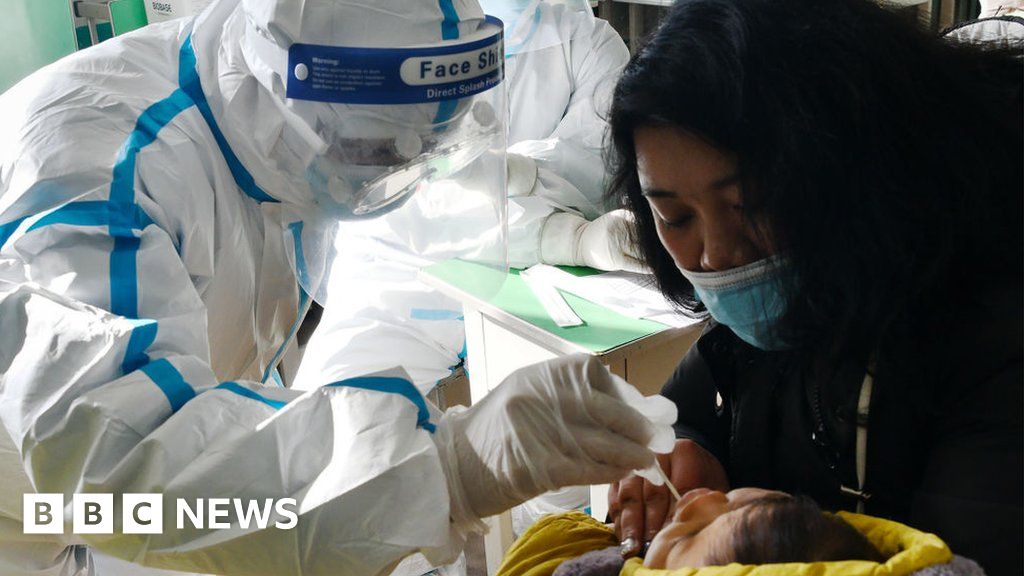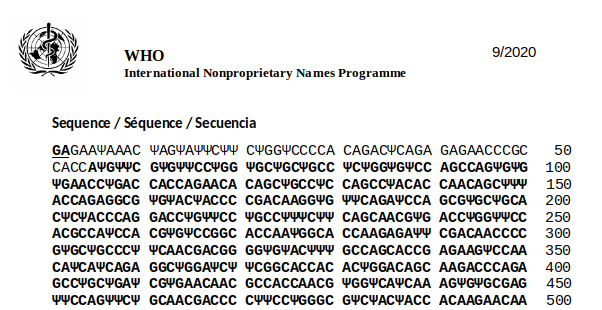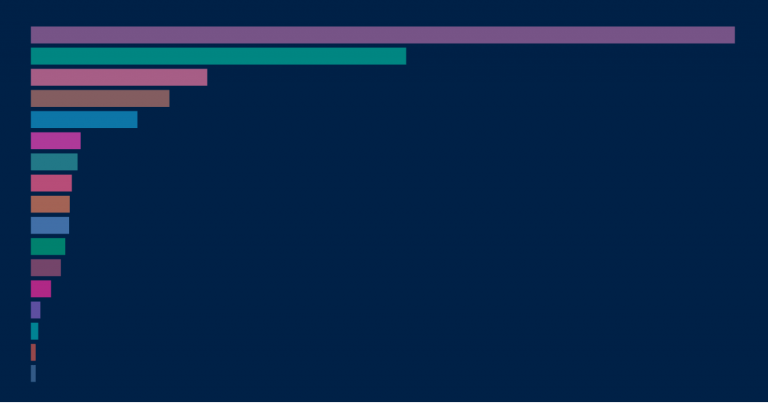Tales from Coronavee-rooss Italy, mamma mia!
-
This is why most of China can go about its life fairly normally.
-
@LaoC said in Tales from Coronavee-rooss Italy, mamma mia!:
This is why most of China can go about its life fairly normally.
This, and because *they:

-
@topspin I have zero confidence in whatever numbers come out of China. OTOH, I have full confidence on the capacity of China of efficiently imposing a lockdown (i.e. physically ensuring that all people in an area don't have any unauthorised contact).
-
@remi said in Tales from Coronavee-rooss Italy, mamma mia!:
An interesting look at the RNA inside the vaccine and why it's the way it is, written for computer people:
The code of the vaccine starts with the following two nucleotides:
GA
The mRNA ‘cap’ has a number of functions. For one, it marks code as coming from the nucleus. In our case of course it doesn’t, our code comes from a vaccination. But we don’t need to tell the cell that. The cap makes our code look legit, which protects it from destruction.Only four bits?
This is somewhat of a problem for our vaccine - it needs to sneak past our immune system. Over many years of experimentation, it was found that if the U in RNA is replaced by a slightly modified molecule, our immune system loses interest. For real.
So in the BioNTech/Pfizer vaccine, every U has been replaced by 1-methyl-3’-pseudouridylyl, denoted by Ψ. The really clever bit is that although this replacement Ψ placates (calms) our immune system, it is accepted as a normal U by relevant parts of the cell.
In computer security we also know this trick - it sometimes is possible to transmit a slightly corrupted version of a message that confuses firewalls and security solutions, but that is still accepted by the backend servers - which can then get hacked.
I've read the article and I'm now somewhat scared of all the backdoors.
-
@JBert said in Tales from Coronavee-rooss Italy, mamma mia!:
@Bulb Point A might also be true because there's really not enough proof for it (though it's very likely that anyone who is effectively immunized will only spread the virus for a short while).
Everything else is a matter of statistics.
Point G is also true. The vaccines were rushed through by consensus with minimal testing, so the manufacturer can't really be held liable for anything. Not their fault, but still true.
-
@remi said in Tales from Coronavee-rooss Italy, mamma mia!:
@topspin I have zero confidence in whatever numbers come out of China. OTOH, I have full confidence on the capacity of China of efficiently imposing a lockdown (i.e. physically ensuring that all people in an area don't have any unauthorised contact).
I also have confidence that they can actually do contact tracing for all the verified infected persons. They already monitor all movements of their citizens about as intensively as Google does. And the secret police likely have the manpower do the human portion of the task.
In contrast, after the first month the Finnish government had effectively given up on tracing the infections.
-
@acrow said in Tales from Coronavee-rooss Italy, mamma mia!:
The vaccines were rushed through by consensus with minimal testing
Unlike the Sinovac and
NovichokSputnik vaccines (where testing amounted to "best I can do is 3"), they did complete the normal Phase III trials with 40,000 people (for the Pfizer/Biontech one, I assume the Moderna and Astra Zeneca ones have similar numbers) and low numbers of side effects. What is true is that we don't have any testing about unexpected long-term effects, because obviously we don't.
"best I can do is 3"), they did complete the normal Phase III trials with 40,000 people (for the Pfizer/Biontech one, I assume the Moderna and Astra Zeneca ones have similar numbers) and low numbers of side effects. What is true is that we don't have any testing about unexpected long-term effects, because obviously we don't.
-
@acrow said in Tales from Coronavee-rooss Italy, mamma mia!:
@remi said in Tales from Coronavee-rooss Italy, mamma mia!:
@topspin I have zero confidence in whatever numbers come out of China. OTOH, I have full confidence on the capacity of China of efficiently imposing a lockdown (i.e. physically ensuring that all people in an area don't have any unauthorised contact).
I also have confidence that they can actually do contact tracing for all the verified infected persons. They already monitor all movements of their citizens about as intensively as Google does. And the secret police likely have the manpower do the human portion of the task.
Hardly. Even if they could (the Indian state of Kerala, considered leading in the technique, employs 2-3 tracers per 1000 population, and China's secret police is unlikely tot have 5 million people for the job), they wouldn't be able to do any other secretpoliceish stuff any more. The trick is not to rely on tracing too much. The city has 11M inhabitants, so lock it down and do 11M tests. And close the fucking schools. If it wasn't obvious that keeping precisely the part of the population from each household that has the haziest concept of mortality and thus always had the highest propensity for risky behavior together in ill-ventilated places for hours a day is a major incubator for COVID: Germany had to try and, surprise surprise, suddenly the incidence among students halved.
In contrast, after the first month the Finnish government had effectively given up on tracing the infections.
Noobs
 No offense, they just didn't have the opportunity to practise that most Asians had with the first SARS epidemic and, in Kerala's case, Nipah.
No offense, they just didn't have the opportunity to practise that most Asians had with the first SARS epidemic and, in Kerala's case, Nipah.
-
@LaoC said in Tales from Coronavee-rooss Italy, mamma mia!:
Noobs No offense, they just didn't have the opportunity to practise that most Asians had with the first SARS epidemic and, in Kerala's case, Nipah.
No, no, my government is right now staffed with all idiots. You can call them just about anything, and I'll nod along. Just don't call them competent. Because that's the one thing they're not.
Vaccination... Finland has vaccinated about 7000 people now. Which is very few, considering that we have a full registry of the population, including occupation, contact information and age. So it should be easy to prioritize.
But you see, there's no plan. No allocated resources. And no-one in charge, apparently: Our Prime Minister has stated on her TV speech that she "hopes that the pace will be accelerated". ...Like,
 . The Prime Minister is the highest legislative and executive leader of this country. They're not supposed to hope shit. They're supposed to make shit happen. Or at least appoint someone to make it happen.
. The Prime Minister is the highest legislative and executive leader of this country. They're not supposed to hope shit. They're supposed to make shit happen. Or at least appoint someone to make it happen.
-
@remi said in Tales from Coronavee-rooss Italy, mamma mia!:
@topspin I have zero confidence in whatever numbers come out of China. OTOH, I have full confidence on the capacity of China of efficiently imposing a lockdown (i.e. physically ensuring that all people in an area don't have any unauthorised contact).
Strange. Why did I agree with your statement immediately?

-
@LaoC said in Tales from Coronavee-rooss Italy, mamma mia!:
This is why most of China can go about its life fairly normally.
China manages to do one thing that we totally fail at—quickly commit resources to whatever they consider solution of the crisis.
Getting the testing up to speed took awfully long in most Western countries, and still does not work at the rate that would be needed. I think it is combination of most politicians being actually quite inapt at organizing things and excessive regulation that makes all the various agencies too rigid to quickly start doing what is needed.
-
@topspin said in Tales from Coronavee-rooss Italy, mamma mia!:
@cabrito said in Tales from Coronavee-rooss Italy, mamma mia!:
So far Italy has been doing around 70K/day last days, I don't know numbers for other countries
Over here the local authorities are complaining "OMG, the idiots didn't order enough doses of vaccine, we're going to run out immediately" (health minister has been explaining since December that at the beginning the available number will be low due to supply/demand), while at the same time apparently only 20% of the supplied doses have actually been used in vaccinations.
Hey, if you're complaining that you need more, fast (and I guess there is enough grounds for complaints there), could you maybe get your own shit together and actually vaccinate people, fast?!Total vaccinations per 1,000 people per state:

Vaccinations per day (pop. 80 mio):

At that rate, vaccinating the whole population will take 2,000 days.
Oh, wait, there are TWO doses to be given some 3 weeks apart - so 4,000 days.
Waiting for 2032 to arrive soon.
-
I can't find any official statistics on vaccinations for Sweden, but we have previously not had any problems with getting vaccinations to the population fast when we had available doses so I'd be surprised if it was a farce this time around. Seems the first doses goes to the elderly in homes, followed by other risk groups. Surprisingly little to complain about.
That said, seems that the new cases are falling again, and number of dead looks like they are falling as well. I'd guess that if it's not just late data collection because of holidays, we'd be down to a slow burn in march/april again just from natural development. Total dead in Sweden is approaching 10000 now, that's about 1/1000th of the population.

It's interesting that the deaths or severe cases are still not surpassing what they were during the first wave, despite number of infected are dwarfing the first wave.
-
@Carnage said in Tales from Coronavee-rooss Italy, mamma mia!:
It's interesting that the deaths or severe cases are still not surpassing what they were during the first wave, despite number of infected are dwarfing the first wave.
I wouldn't really call it that interesting, given that everyone agrees that there was close to no proper testing done during the first wave, so "number of infected" was just a WAG (you could say that for now as well, but the point is that, essentially, the methodology is entirely different now compared then). It's the same for every country that I've seen.
I heard a medical professional recently discussing stuff like positivity rate and how, combined with other measures, it can actually give an indication as to whether the testing is correctly sampling the population or not (again, not mentioning the accuracy of the test itself, but just whether the number we get is representative of what the number would be if the same test was applied to the whole population). IIRC, the idea was that people getting tested are more likely to be those with symptoms, so assuming the number of infected stays the same a smaller positivity rate is better as it shows you're correctly sampling the huge majority of negative people. Somewhat counter-intuitive at first, and not easy to apply in practice (because of that tiny (!!!) assumption...), and it has to be blended with other effect (such as false positives) before drawing any conclusions, but interesting nonetheless.
-
@remi said in Tales from Coronavee-rooss Italy, mamma mia!:
I wouldn't really call it that interesting, given that everyone agrees that there was close to no proper testing done during the first wave, so "number of infected" was just a WAG (you could say that for now as well, but the point is that, essentially, the methodology is entirely different now compared then). It's the same for every country that I've seen.
The number of deaths here are much higher than during the first wave.
-
@remi That's why things like the rate of admission of people in hospital are a better guide/proxy for the number of people with the disease. The data for that is ever so much more reliable, and the fraction of people with the disease getting it severely enough to need hospital admission is largely constant even with the mutated variants. OTOH, it also lags the infection events by longer…
The differences between that and the death rates (after appropriate temporal adjustments) mostly measure the effectiveness of (non-vaccination) medical interventions.
-
@remi said in Tales from Coronavee-rooss Italy, mamma mia!:
@Carnage said in Tales from Coronavee-rooss Italy, mamma mia!:
It's interesting that the deaths or severe cases are still not surpassing what they were during the first wave, despite number of infected are dwarfing the first wave.
I wouldn't really call it that interesting, given that everyone agrees that there was close to no proper testing done during the first wave, so "number of infected" was just a WAG (you could say that for now as well, but the point is that, essentially, the methodology is entirely different now compared then). It's the same for every country that I've seen.
I don't think that applies as well to "severe cases and deaths," as more or less already noted.
-
@boomzilla @dkf @topspin I feel we're talking past each other...?

I only said what I did to highlight the fact that IMO there is nothing particularly "interesting" in seeing very different "death (or serious cases) vs. number of cases" ratios in the two waves, because the denominator of that ratio wasn't measuring the same thing in both waves. That's all. I'm not saying anything about the accuracy/usefulness of the other measure, or whether one wave is worse than the other or not. All of your answers just seem like stating the obvious to me?
-
@remi said in Tales from Coronavee-rooss Italy, mamma mia!:
@boomzilla @dkf @topspin I feel we're talking past each other...?

I only said what I did to highlight the fact that IMO there is nothing particularly "interesting" in seeing very different "death (or serious cases) vs. number of cases" ratios in the two waves, because the denominator of that ratio wasn't measuring the same thing in both waves. That's all. I'm not saying anything about the accuracy/usefulness of the other measure, or whether one wave is worse than the other or not. All of your answers just seem like stating the obvious to me?
We read it differently, I think. I read it as comparing the rates of "serious cases and deaths" between the two waves. So your talk about "cases" didn't make much sense.
-
@remi Carnage called it interesting that their death rates are lower than the first wave despite much higher case numbers. You said it wasn't interesting. Since our death rates are much higher than the first wave, I did consider what he said interesting.
-
@topspin @boomzilla I get it now, thanks for clarifying. I guess I should have made it clearer that I was commenting on the "despite number of infected are dwarfing the first wave" bit rather than the "still not surpassing" part.
-
@Bulb said in Tales from Coronavee-rooss Italy, mamma mia!:
China manages to do one thing that we totally fail at—quickly commit resources to whatever they consider solution of the crisis.
Getting the testing up to speed took awfully long in most Western countries, and still does not work at the rate that would be needed. I think it is combination of most politicians being actually quite inapt at organizing things and excessive regulation that makes all the various agencies too rigid to quickly start doing what is needed.
I think it’s because of the fundamental difference in how the countries are organised: western countries are set up so that different sides have a say in decisions to be made, while China has essentially the One Man, One Vote system, just substituting “Party” for “Man". Stuff can happen fast in that kind of system if it needs to.
Of course, it has all kinds of downsides as well that the western counterpart by and large doesn’t suffer from, for the exact same reason.
-
@Gurth said in Tales from Coronavee-rooss Italy, mamma mia!:
China has essentially the One Man, One Vote system
China's is inferior, though. Xi Jinping is not nearly as entertaining as Lord Vetinari.
-
@HardwareGeek said in Tales from Coronavee-rooss Italy, mamma mia!:
@Gurth said in Tales from Coronavee-rooss Italy, mamma mia!:
China has essentially the One Man, One Vote system
China's is inferior, though. Xi Jinping is not nearly as entertaining as Lord Vetinari.
No idea who that is, but by comparison Best Korea is pretty entertaining.

-
@topspin said in Tales from Coronavee-rooss Italy, mamma mia!:
No idea who that is
No idea who Lord Vetinari is, or no idea who Xi Jinping is? If you don't know who Lord Vetinari is, get thee to thy local merchant of fine literature and obtain for yourself some writings of Sir Terry Pratchett. (He's the Patrician in the quote @Gurth linked.)
-
@HardwareGeek said in Tales from Coronavee-rooss Italy, mamma mia!:
He's the Patrician in the quote @Gurth linked.
Now you made me click it.

-
@Gurth said in Tales from Coronavee-rooss Italy, mamma mia!:
just substituting “Party” for “Man"
After short period of that substitution they stopped again. Uncle Xi is The Man now.
-
@Gurth said in Tales from Coronavee-rooss Italy, mamma mia!:
Stuff can happen fast in that kind of system if it needs to.
Stuff can happen quite fast in a system with elected officials too, but it would have to not be tied with this much red tape and the officials would have to have some skills beyond talking bullshit.
-
@Bulb said in Tales from Coronavee-rooss Italy, mamma mia!:
Stuff can happen quite fast in a system with elected officials too
Sure. When officials have something personal to gain, stuff tends to happen quite fast.
-
@Zerosquare said in Tales from Coronavee-rooss Italy, mamma mia!:
@Bulb said in Tales from Coronavee-rooss Italy, mamma mia!:
Stuff can happen quite fast in a system with elected officials too
Sure. When officials have something personal to gain, stuff tends to happen quite fast.
Especially when they think that not acting will cost them the next election.
-
@Bulb said in Tales from Coronavee-rooss Italy, mamma mia!:
@Gurth said in Tales from Coronavee-rooss Italy, mamma mia!:
Stuff can happen fast in that kind of system if it needs to.
Stuff can happen quite fast in a system with elected officials too, but it would have to not be tied with this much red tape and the officials would have to have some skills beyond talking bullshit.
Are you sure about that? Because in your typical Western country, when a decision is made quickly, all kinds of groups with an interest in it (that is contrary to the way the decision went) will appeal it on various levels, from parliamentarians to activist groups with an axe to grind to average people who see a wrong that must be righted.
-
@Gurth Don't forget the people who have a financial interest in the decision having gone the other way.
-
-
vaccination stats
-
@Gurth said in Tales from Coronavee-rooss Italy, mamma mia!:
@Bulb said in Tales from Coronavee-rooss Italy, mamma mia!:
@Gurth said in Tales from Coronavee-rooss Italy, mamma mia!:
Stuff can happen fast in that kind of system if it needs to.
Stuff can happen quite fast in a system with elected officials too, but it would have to not be tied with this much red tape and the officials would have to have some skills beyond talking bullshit.
Are you sure about that? Because in your typical Western country, when a decision is made quickly, all kinds of groups with an interest in it (that is contrary to the way the decision went) will appeal it on various levels, from parliamentarians to activist groups with an axe to grind to average people who see a wrong that must be righted.
A system with elected officials does not mean it has to allow all those things. In fact at least in our case the “state of emergency” exists exactly to allow making things happen quickly that can be challenged, but it will not postpone them. The cabinet still utterly failed to make efficient use of it.
-
@Bulb said in Tales from Coronavee-rooss Italy, mamma mia!:
The cabinet still utterly failed to make efficient use of it.
This crisis has been an excellent way to find out who is actually competent. Turns out… many politicians worldwide aren't! Who knew?!

-
@dkf Now the more important question… is there any way we can tell the actually competent one next time before the incompetent ones screw us up again?
-
@Bulb said in Tales from Coronavee-rooss Italy, mamma mia!:
@dkf Now the more important question… is there any way we can tell the actually competent one next time before the incompetent ones screw us up again?
Given that there is vehement disagreement in some cases of what I'd rate to be obviously incompetent and others who are obviously competent...I can't see that there's any way to get consensus on that prior to anything if we can't even agree on what a competent response looks like.
-
@Bulb said in Tales from Coronavee-rooss Italy, mamma mia!:
is there any way we can tell the actually competent one next time
On the basis of worldwide evidence so far, being female seems to help in the political competence stakes. They seem to be a little more inclined to listen to expert advice and a bit less inclined to do dumb posturing than their male counterparts.

Still plenty of stupid around. I don't think it's a foolproof approach.
-
@dkf said in Tales from Coronavee-rooss Italy, mamma mia!:
@Bulb said in Tales from Coronavee-rooss Italy, mamma mia!:
is there any way we can tell the actually competent one next time
On the basis of worldwide evidence so far, being female seems to help in the political competence stakes. They seem to be a little more inclined to listen to expert advice and a bit less inclined to do dumb posturing than their male counterparts.

I haven't seen evidence of that. And there are experts saying lots of different things. They haven't exactly covered themselves in glory either.
-
@boomzilla There was a lot of misinformation about, and things have been very much not helped by the way China acted in the early stages. (The data out of there is definitely bad, and definitely mislead people elsewhere to start with.)
But apart from that things have largely settled out now (except for some bits which aren't really understood yet) with treatment plans in place that make it… still not something that anyone sensible would want. In particular, it has a fairly high death rate by modern standards and long covid remains a weird and nasty syndrome that shouldn't be wished on anyone. Vaccines are on the way and appear to work, but will take a while to roll out to all so things can't be opened up yet. Masking works… when people bother to do it right, but some can't seem to do it and others refuse to do it. Lockdown and social distancing work (with high cost).
The exact details of any and all recommendations will be subject to revision as more is learnt. Of course.
-
@dkf I don't disagree with anything you said there, though we probably have some different things in mind when it gets down to details.
-
@dkf said in Tales from Coronavee-rooss Italy, mamma mia!:
On the basis of worldwide evidence so far, being female seems to help in the political competence stakes. They seem to be a little more inclined to listen to expert advice and a bit less inclined to do dumb posturing than their male counterparts.
Still plenty of stupid around. I don't think it's a foolproof approach.Definitely not foolproof. The chancellor of the neighbouring country here is a very good counter-example, though in her case the events from five years ago are much more significant than any recent events.
@boomzilla said in Tales from Coronavee-rooss Italy, mamma mia!:
And there are experts saying lots of different things. They haven't exactly covered themselves in glory either.
My current understanding is that the way science is done lately is a major contributing factor. Science has become highly competitive, so everybody wants to publish something of their own, which makes it harder to consolidate all the various fragments to something the government advisors could actually process, understand and base consistent advise on. It also breaks down the effort that would be needed for really large scale analysis and solid verification of results.
@dkf said in Tales from Coronavee-rooss Italy, mamma mia!:
The exact details of any and all recommendations will be subject to revision as more is learnt. Of course.
And we've had almost a year of experience now and plenty of things could be learned by comparing with earlier epidemics of both related (SARS) and unrelated diseases and the expert advice still sounds more like gut feelings than anything actually founded in evidence.
-
@Bulb said in Tales from Coronavee-rooss Italy, mamma mia!:
@boomzilla said in Tales from Coronavee-rooss Italy, mamma mia!:
And there are experts saying lots of different things. They haven't exactly covered themselves in glory either.
My current understanding is that the way science is done lately is a major contributing factor. Science has become highly competitive, so everybody wants to publish something of their own, which makes it harder to consolidate all the various fragments to something the government advisors could actually process, understand and base consistent advise on. It also breaks down the effort that would be needed for really large scale analysis and solid verification of results.
Definitely. However, there's also the issue that public policy is about looking across domains (e.g, medicine, public health, economics, etc) and weighing alternatives and making decisions. For instance, lockdown vs Barrington-targeted-protection.
-
@Bulb said in Tales from Coronavee-rooss Italy, mamma mia!:
is there any way we can tell the actually competent one next time before the incompetent ones screw us up again?
Easy. The competent people usually don't go into politics. And if they try, they get stabbed in the back by their incompetent adversaries, since they would be dangerous to them.
-
@Bulb said in Tales from Coronavee-rooss Italy, mamma mia!:
The chancellor of the neighbouring country here is a very good counter-example
The Los Angeles County Director of Public Health is another. This isn't the Garage, so I'll refrain on commenting on the degrees she does have, but she does not have a degree in medicine.
-
@boomzilla said in Tales from Coronavee-rooss Italy, mamma mia!:
However, there's also the issue that public policy is about looking across domains
Totally. After epidemiologists come up with measures that would slow the epidemics down—and hopefully provide some estimate by how much—a sociologist needs to weigh in with whether it's possible to persuade people to actually follow it, economist with estimating the collateral damage to economy and so on. Unfortunately, our cabined appears to have had neither of those specializations in the advisory team that crafted the latest guidelines…
Which starts with the scientists already too. Everybody is heavy on statistics now, but how many include a statistician in their team to ensure they are using it correctly and only draw conclusions it actually supports? Or a programmer when making a computer model to verify it produces consistent results and does not depend on thread order, values in uninitialized memory and the phase of the moon?
-
@HardwareGeek said in Tales from Coronavee-rooss Italy, mamma mia!:
@Bulb said in Tales from Coronavee-rooss Italy, mamma mia!:
The chancellor of the neighbouring country here is a very good counter-example
The Los Angeles County Director of Public Health is another. This isn't the Garage, so I'll refrain on commenting on the degrees she does have, but she does not have a degree in medicine.
For a director position, degree in the domain is not necessary. A director—any director anywhere—should be organizing the work and rely on the experts in the organization for the expert side of things. It does help if they do have some understanding of the domain, but the organization skills are much, much more important. So if she was a capable organizer, it wouldn't matter what degrees she has. I don't have much overview of the situation in that neck of woods, but I suppose she isn't…
-
@Bulb said in Tales from Coronavee-rooss Italy, mamma mia!:
rely on the experts in the organization for the expert side of things...
... without filtering them through a lens of political bias and activism. At least three of her four degrees point toward an inability to do this.
-
I know, politics, but there's something in the article that raises a few questions for me and I want to get educated by people who have a positive opinion about the vaccination program, ie. not the ones in Garage.
Additionally, the two vaccines currently authorized for emergency use by the US Food and Drug Administration have not yet been shown to prevent infection. They have been shown to prevent symptoms and severe disease.
This is the first time I ever heard about this. Maybe I'm just at reading news, but I was under impression they were meant to prevent infections, and thus further transmissions of the virus, and not just remove symptoms - speeding up the buildup of herd immunity.
Anyway. If the vaccine doesn't prevent infection, does it mean it's useless at eradicating the virus and the only way is to keep vaccinating everybody forever? Or is there something I'm missing?




